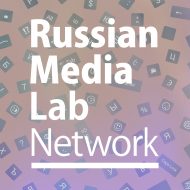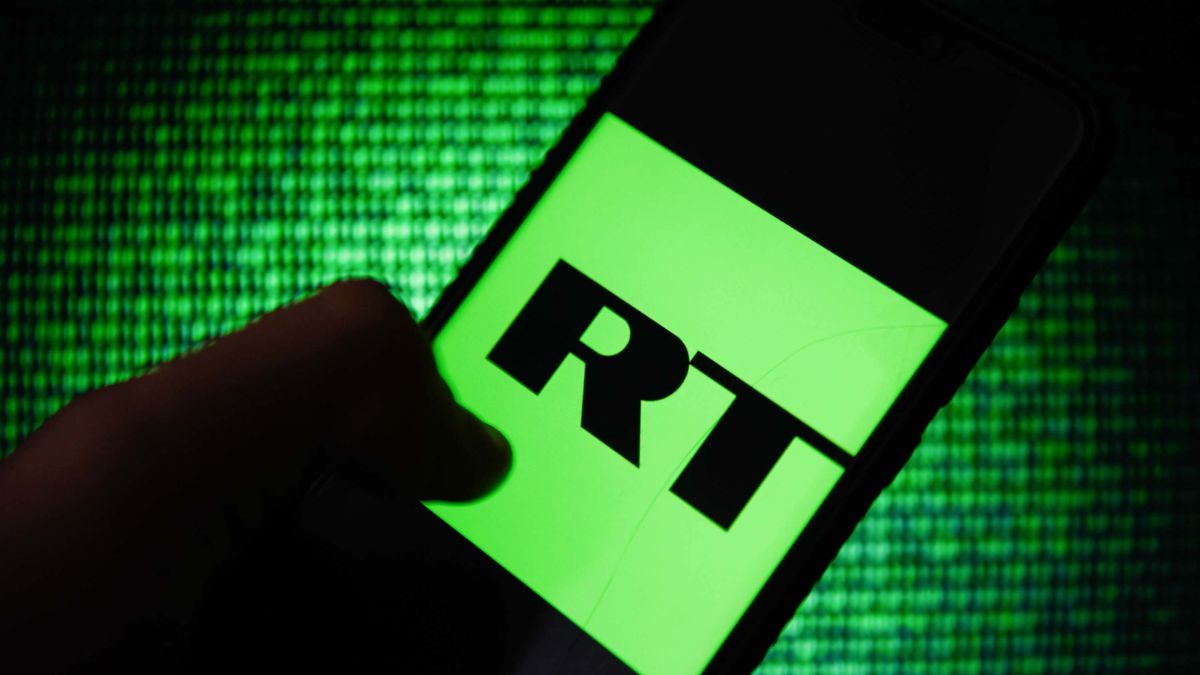 by Teemu Oivo
by Teemu Oivo
Vera Tolz is Sir William Mather Professor of Russian Studies at the University of Manchester and Fellow of the Academy of Social Sciences. Since 2017, Tolz has been a team member of the project ‘Reframing Russia for the Global Mediasphere: From Cold War to “Information War”?’. The project studies Russia’s main state-funded international broadcaster RT’s (formerly Russia Today) strategies to connect with its audiences through its various platforms and language versions, and the impact on the audience reception.
Now visiting Helsinki for this year’s Aleksanteri Conference, Tolz follows her project colleagues Stephen Hutchings, Precious Chatterje-Doody and Rhys Crilley as our latest interviewee, talking about the latest findings from the research on RT’s content, campaigns and their audiences.
The approaching year 2020 is the fourth and final year for the project ‘Reframing Russia for the Global Mediasphere’. How is this autumn going from the project standpoint?
For the first two years, we have been collecting empirical information, because around RT’s information campaigns there is a lot of speculation and conclusions made on assumptions rather than on hard evidence. Now, in the third year of the project we can draw broader conclusions. First, what is very clear to us is that RT and Russia’s media communications strategies in general should be put into a global context, highlighting that what Russia is doing is not unique at all. There are various other state and non-state affiliated actors using similar techniques. Secondly, even though there are parallels with Soviet propaganda campaigns, the media environment has become very different. The information cannot be systematically controlled and censored. Thirdly, we need to distinguish between something like RT, a legally operating media outlet and the activities of hackers, trolls and bots that disseminate information differently, but they are lumped together. Finally, there is a perception of a well-functioning propaganda machine controlled by the Kremlin. Our research shows that this is not actually the case.
We have done quite a bit of research on audiences. Most of this work is conducted by our project team members from Open University in the UK. Particularly interesting is big data research, where by using specific computer technologies and a network analysis, we have profiled RT audiences. The audience is more normal than it is often claimed. From a sample of 2.5 million people who follow RT on Twitter, our research ascertains that the largest group of other media that RT’s audiences follow represent mainstream media such as BBC and CNN. However, half of all the media that the users of BBC world service and CNN follow is mainstream, whereas for the RT followers, the share is only a quarter, which is actually a notable difference. In addition, among the followers of BBC and CNN, the people who follow marginal and radically alternative media – far right or far left – are not significantly visible in the network analysis, whereas with RT, they constitute ten percent.
In our project, the research by Precious Chatterje-Doody has yielded interesting findings about the overall quality of the RT news output. There are some completely fake stories, but these are uncommon. The main RT tactics is to produce biased interpretations or promote a particular single interpretation, which is actually quite typical for British tabloid press as well. Simultaneously, RT’s output includes high quality journalism. This is very logical, because without that the channel would not have had even the small audience that it does have – roughly one percentage of the overall viewing audiences (in the UK). There is for instance a program called “Worlds Apart”, hosted by Oksana Boyko, who interviews prominent and controversial people. Boyko is a very high-quality journalist. Even in the very difficult circumstances covering the Skripal poisoning, from the clearly Russian point of view, she did a fairly good job interviewing the father of Aleksandr Litvinenko, the poisoned Russian defector. Litvinenko’s father promoted anti-Western conspiracy theories and while the UK’s broadcasting regulator Ofcom investigated this interview for potential biases, they found that it did not breach the regulations on due impartiality. In addition, RT sometimes has quite high-quality projects around social media.
I would add that one of our conclusions is that RT maintains its broadcasting and produces outputs in western languages, in part to perform Russia’s image as a great power. A great power has to have a major international broadcaster, as the UK and the United States do. There is one part of RT, where they have a sizeable and growing audience – and that is RT Arabic. Its audience began to grow ultimately because of the collapse of the credibility of Al Jazeera in the Middle East. Al Jazeera overtly sided with revolutionaries during the Arab spring, but the societies are very split and there are certain powerful forces against the Arab Spring line. With the credibility or impartiality of Al Jazeera being questioned, RT has filled this void. Particularly, the supporters of Assad in Syria are a major contingent of RT Arabic consumers. Regarding the audiences of RT Arabic, our project’s Open University team has an interesting research publication forthcoming. Moreover, there is another area, with which we haven’t done any work, but I can say from figures we have that the RT Spanish has quite a sizeable audience in Latin America.
In a recently published issue of European Journal of Cultural Studies, there is an article where you and Precious Chatterje-Doody examine RT’s 1917 revolutions commemoration campaign in social media. Was this campaign exceptional from RT and its usage of social media?
It was both exceptional and not. It was not exceptional in the sense that the social media department of RT has good resources and it is at the core of RT operation. The people who lead it, including the deputy head of department Ivor Krotty, are under some restrictions, but with autonomy to experiment. On the whole, RT is better than BBC in using social media to disseminate its message. This is not surprising because it is a new channel, founded in 2005 at the time when social media began proliferating. Hence, they incorporated social media projects into RT’s portfolio from the very beginning. My colleague Stephen Hutchings led an interesting work on RT’s use of social media during the Sochi Olympics, when it was already quite creative. In 2018, RT developed a social media-based project around the World Cup in Moscow, and an article by our Open University team on that topic is soon coming out. Still RT’s project to commemorate the revolution, the #1917Live, has been the biggest and probably the most successful social media project led by the channel. The project involved an RT team tweeting daily for over a year from January 2017 into 2018. They tweeted in the names of very prominent figures in Russian politics 100 years ago, using, sometimes changing slightly, both quotes and visual images produced during the actual revolution.
My article with Precious (Chatterje-Doody) attempted to theorize the regime of commemoration in Russia. We compared the narratives generated in RT’s #1917Live and in Russian television programs for domestic audiences. There were very different narratives articulated for domestic and international audiences. Already in 2016, historians and political analysts working on Russia started to publish predictions of the domestic narratives of the 1917 revolutions. All speculated how Putin’s government was going to cover the anniversary. The main prediction was – acknowledging that Putin himself is very opposed to revolutions in general – that the Soviet legacy would be selectively championed, and the contemporary Russia would be presented as an heir of the positive side of the Soviet legacy, including the victory in the WWII, the space program, industrialization and so on. That is indeed how the domestic TV coverage began: praising these sides of Soviet legacy, while criticizing revolution as a phenomenon. However, at the time of the Bolshevik Revolution anniversary in October 2017, domestic television channels broadcast multi-episode series, which were entirely critical not only of the revolutionary regime change, but also said nothing positive at all about the Soviet legacy. The October 2017 domestic television coverage was basically about the bloodshed of the Civil War and Stalin’s period, whereas there was a positive image given of Nicholas II and late Imperial Russia.
RT had a different narrative. It was more ambiguous, not surprisingly, since it engaged audiences as producers of content. From messages disseminated through the #1917Live accounts set up by RT staff, it was very clear that they understood that the majority of people interested in RT’s Twitter project on the revolution would have left-wing leanings, with slightly romantic view of the revolution. The narrative produced by RT’s own accounts, therefore, talked about the progressive revolutionary heritage, the question of gender equality, minority rights, worker’s rights and so on more positively. From that, we can see how strategically and opportunistically Putin’s regime is using information, including historical information. There is no overarching narrative, apart from the one that revolutions generally lead to bloodshed. The opportunistic use of the moment and the response to very specific short-term circumstances are very apparent. There are sudden shifts of narrative on historical issues, even though we have the same government in power. What I think requires more research is that there are parallel developments in other contemporary non-democratic states, like China, Turkey and Latin American autocracies like Venezuela. There are no stable ideological narratives, but very sudden shifts depending on the immediate priorities of the political elites in power.
You noted how RT did not apparently mind the narratives against the current Russian regime in the Twitter messages of the #1917Live. Is RT looking for any kind of audience engagement or can we draw some particular engagement that they are looking for to be successful?
Clearly, the particular engagement that they are prioritizing is the criticism of the West. Even in the course of the #1917Live project, some participants articulated narratives that shifted the focus from Russia in 1917 to the failings of Western democracies and capitalism today. However, even if this is the preferred form of engagement, RT’s management understands that this kind of anti-western messages cannot be their only narrative. Precious Chatterje-Doody’s investigative work analyzing RT’s news throughout two years showed that about 55 percent of the output was criticizing western foreign policies or internal situations in western societies, but the remaining 45 percent was something else.
One of the founding reasons for the project Reframing Russia was to provide a better overall perspective on RT. While the academic research has taken steps forward in this perspective, is the public perception of RT changing?
I can speak about the UK public sphere. To some extent, you can see a shift. Among politicians and some mainstream journalists there is a greater realization that what RT is doing is not unique. Even a year or two ago the Russian information campaigns were singled out as very specific or even unique and a major cause of social and political problems western democracies are currently experiencing. Now there is a gradual shift towards the acceptance that what RT is doing is not exceptional or a cause, but a symptom. In a way not exceptional because in the recent years the turmoil around Brexit and behavior of certain politicians, including the Prime minister Boris Johnson – and of course Trump – are breaking taboos in terms of lying directly. Communications strategies between RT, Russia and these highly populist new leaders in the West have become very apparent. Therefore, there is a greater understanding in the UK that there are actors with arguably more impact on policies and practices in western societies than Russia or RT, and these actors are actually internal to western societies.
A particular shift is noticeable in UK newspaper the Guardian, which has been covering the matter on a regular basis for over several years. They changed the framework for analysis of Russia’s strategy and even moved from foregrounding the discussion of what Russia is doing to actually looking at internal actors. A good example was in connection with the question whether it was RT which was particularly responsible for promoting and publicizing the profile of Nigel Farage – one of the key proponents of Brexit. Connected with the European elections, where Farage’s Brexit party did very well, in May 2019, there was an article in the Guardian saying that RT created Farage. We came back with a quick piece with the Washington Post actually showing that the BBC’s YouTube channel had more widely-viewed videos of Farage than RT, because they constantly invited him for the balancing opinion, without actually challenging properly what he was saying. RT’s videos were on the 15th place in terms of the number of viewing and BBC was on the second place after Farage’s and his party’s own attempt to use the platform. The Guardian journalist who wrote the piece immediately responded agreeing with this. So, there is this kind of shift in discourse, which I think is actually very positive, because regarding the current threats to the representative democracy and its crisis in the west, there are external actors trying to use it to their own advantage, but there are also internal problems which have to be addressed.
Another thing that has been very powerful sort of narrative is that Russia is winning the information war, which is again what our project is challenging. I think the failure of the interview between the editor-in-chief Margarita Simonyan and the two suspects of the Skripal poisoning made a big dent in this narrative about Russia winning. We did an interesting research around the responses of audiences to the interview. Within two hours after the interview was posted to YouTube, over 70 percent of responses in both the Russian and the UK social media spheres were very critical of Russia and the credibility of this interview. It backfired spectacularly for Russia and raised the question about the ability of authoritarian states like Russia to successfully weaponize information.

